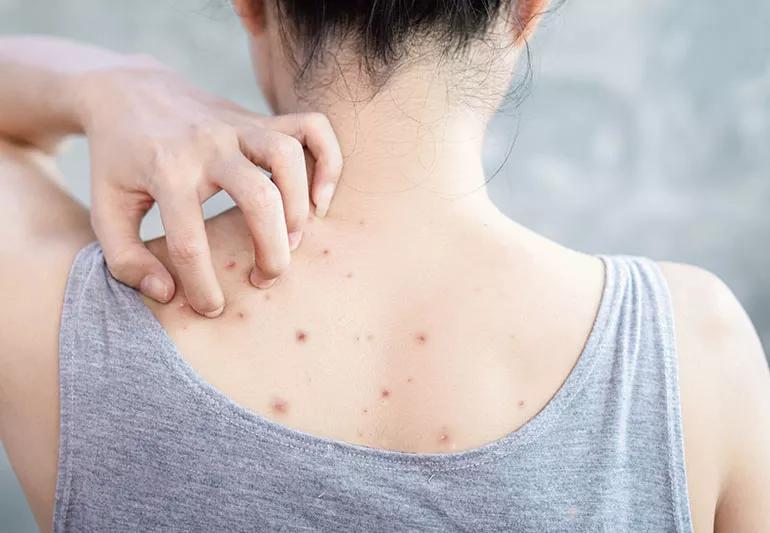Keeping your skin healthy post workout is key

Image content: This image is available to view online.
View image online (https://assets.clevelandclinic.org/transform/2cd97fcd-7af0-4298-bced-6411651dc025/Exercising-Acne-1199366228-770x533-1_jpg)
Person touching back with acne.
Working out is one of the best things you can do for your health. Regular exercise can help you control your weight, boost strength and flexibility, improve heart health and reduce stress. The list of benefits is long!
Advertisement
Cleveland Clinic is a non-profit academic medical center. Advertising on our site helps support our mission. We do not endorse non-Cleveland Clinic products or services. Policy
The effects of exercise on acne, however, aren’t as clear-cut, says dermatologist John Anthony, MD. “Each person has different factors that trigger or prevent acne,” he says. “How exercise affects someone’s skin can vary widely.”
Acne develops in the hair follicles, or pores, of your skin. Glands inside of your pores produce sebum, an oily substance that helps keep your skin and hair moist. Sebum, bacteria and dead skin cells can plug your pores and cause pimples.
“Those plugs are not really dirt,” says Dr. Anthony. “Acne is a feature of your skin, hormones and genetics. Outside factors such as stress, medications and diet can also contribute. Some people believe you can scrub these plugs away, but that’s not usually the case.”
There are many types of pimples, ranging from blackheads and whiteheads to more inflamed nodules and cysts. Pimples are most common during the teen years, but nearly everyone experiences acne at some point. Some people still get acne well into adulthood.
Maybe, says Dr. Anthony. “Not all people find that exercise improves their acne.”
But there’s some evidence that exercise may help.
For example, one recent study looked at the skin health of elite athletes who exercised more than eight hours per week. The researchers found that these athletes had less acne and other skin problems than recreational athletes who exercised for fewer hours.
Advertisement
Another study asked participants what they noticed about acne. More than 40% felt that exercise led to improvement.
Though there’s limited data, exercise may affect acne through:
For some people, exercise makes acne worse. This effect might be due to increased sweat and oil on the skin that clogs pores.
Exercise supplements that boost androgens or testosterone can also cause acne flares. Androgens, which include testosterone, are a group of hormones that help reproductive health and development. People take androgenic supplements to increase muscle mass. Dr. Anthony recommends avoiding these supplements for clearer skin.
“The good news is that even if you feel like exercise aggravates your acne, there are ways to manage that,” he notes.
If you have acne-prone skin, your skin care regimen should include cleansing twice daily and applying a noncomedogenic moisturizer as needed. Sunscreen is also essential if you’ll be outdoors during the day.
Make sure the products you use are noncomedogenic, which means they won’t clog your pores.
After a workout, Dr. Anthony recommends cleansing your skin right away. “Use a medicated cleanser if you have a prescription,” he says. “Otherwise, try an over-the-counter cleanser that contains salicylic acid or benzoyl peroxide.”
Other post-workout recommendations include:
Dr. Anthony recommends talking to your healthcare provider or dermatologist if you have:
There are many over-the-counter treatments and home remedies — some more effective than others. The effectiveness of a treatment often depends on the type of acne you have. For example, cystic acne doesn’t respond to over-the-counter medicines.
Advertisement
If you’ve tried over-the-counter products without success, you may need stronger prescription medications. Your healthcare provider may prescribe:
Being active is important, and acne shouldn’t interfere with your exercise routine. If you notice that your acne gets worse when you work out, reach out to a healthcare professional. They have a range of tools to treat your condition so you feel comfortable hitting the gym, field or trail.
Advertisement

Sign up for our Health Essentials emails for expert guidance on nutrition, fitness, sleep, skin care and more.
Learn more about our editorial process.
Advertisement
It’s best to avoid picking at zits, which can damage your skin (though there are ways to minimize the risk)
This medication only works well for short periods of time and when paired with other treatments
‘Zit stickers’ can help heal a new or popped pimple, but they’re limited when it comes to managing acne
Try exfoliating and using salicylic acid to treat this pesky skin care issue
Wear light, breathable clothing, shower after you exercise and change your sheets regularly
As you age, hormones can continue to play a big role in breakouts
Some remedies might help banish breakouts, but others are best avoided
Birth control pills with estrogen are best for fighting hormonal acne
Prioritize your health by managing stress, strengthening your social connections and getting quality sleep
Bolsters, blankets, pillows and blocks can offer extra support, stability and comfort
Allergies, postnasal drip, asthma or reflux could be to blame for a cough that won’t quit